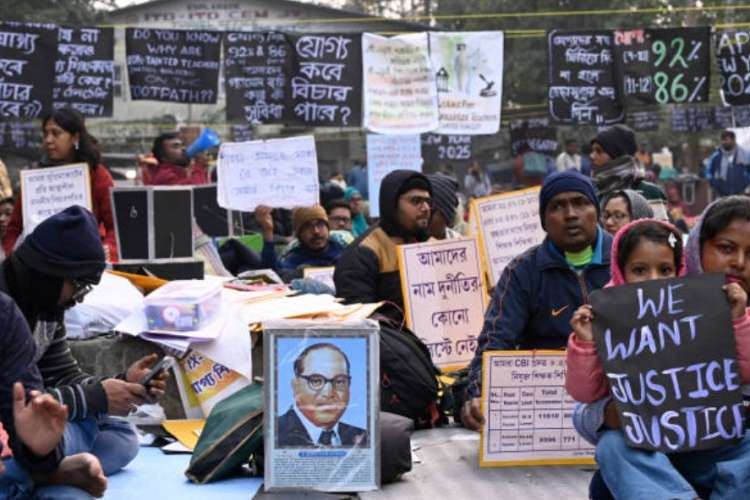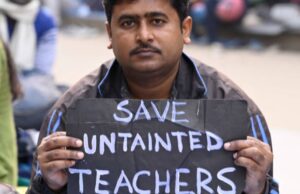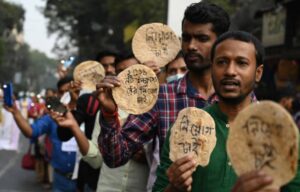
West Bengal SSC recruitment scam: On April 3, 2025, the Supreme Court of India upheld a landmark verdict by the Calcutta High Court, quashing nearly 25,000 appointments made by the West Bengal School Service Commission in 2016. The ruling, a decisive blow against corruption, has also become a textbook case of collateral damage—where thousands are made to bear the burden of a system’s moral collapse.
The apex court left no room for ambiguity, declaring the recruitment process “vitiated and tainted beyond resolution.” With no feasible mechanism to separate the innocent from the guilty, the court was compelled to invalidate the entire selection. It is a damning indictment of institutional failure. When a system loses the ability—or the will—to distinguish wrongdoing from due process, justice itself becomes collateral.
READ | Interest rate cuts alone won’t fix India’s spending slump
This case forces a painful question. In the quest to uphold integrity, has the judicial system inadvertently punished thousands who may have been entirely innocent?
Human cost of a broken system
Legal scholars have long warned of the “collateral consequences” that extend beyond the courtroom—job loss, social exclusion, and reputational harm. Here, those consequences are acutely visible. Around 25,000 individuals—many of whom prepared rigorously, cleared exams, and served in good faith—now face abrupt termination. Their families, aspirations, and futures hang in limbo. For them, the Supreme Court’s verdict is not just a legal outcome, but a life-altering rupture.

As Senior Advocate Abhishek Manu Singhvi rightly observed, the failure to segregate the innocent from the guilty carries devastating implications. It casts a shadow not only on justice but on the very promise of state institutions to protect honest citizens.
State accountability: A failure of will, not capacity
What makes this episode particularly disquieting is that segregation between tainted and untainted candidates was possible. The CBI itself acknowledged during hearings that some degree of differentiation had been achieved. WBSSC’s counsel, Senior Advocate Jaideep Gupta, pointed to procedural measures that could have reconciled irregularities. Yet, no meaningful action followed.

Whether due to incompetence or unwillingness, the state government’s failure to act on this knowledge left it exposed to judicial censure. In the end, it wasn’t just the corrupt who paid the price, but an entire cohort of hopefuls—an enduring example of governance gone wrong.
Socioeconomic fallout of Bengal SSC recruitment scam
From a political economy lens, this case is symptomatic of deeper rot in state-level governance. Electoral compulsions, patronage networks, and institutional opacity often feed into each other. In such an environment, public jobs are not just economic lifelines—they are badges of legitimacy, especially in rural and semi-urban India.
When recruitment integrity collapses, the fallout goes beyond legal culpability. It erodes public trust, impedes social mobility, and breeds class resentment. The damage is not just administrative—it is deeply personal. Families are thrown into crisis. Careers are cut short. And with age and stigma against them, many of the dismissed candidates may find themselves permanently shut out of government service.
Economically, the impact is no less grave. This mass dismissal removes tens of thousands of productive individuals from the workforce, adding to underemployment in an already saturated job market. These weren’t just jobs; they were potential engines of rural upliftment and local economic vitality. The ripple effects will be felt in consumption patterns, community stability, and mental health outcomes for years to come.
Institutional reform: Urgency and opportunity
This episode must serve as a clarion call for systemic reform.
First, public recruitment must be safeguarded through stringent transparency protocols, robust record-keeping, and independent oversight. The destruction of original OMR sheets—though within regulatory bounds—undermined the possibility of forensic scrutiny that could have exonerated many.
Second, digital data management must be institutionalised. The reliance on outsourced entities such as NYSA Communications and Data Scantech Solutions—with little accountability—proved to be a critical vulnerability. That vital recruitment data had to be salvaged from a former employee’s personal hard drive is a damning reflection of administrative negligence.
Third, states must take moral responsibility for institutional breakdowns. It is not enough to blame legacy systems or bureaucratic limitations. If the government had acted decisively in 2016—or even shortly thereafter—this catastrophe might have been averted.
Finally, public institutions must internalise a core democratic principle: collective punishment corrodes the very ideals justice is meant to uphold. Sweeping decisions without nuance alienate citizens and deepen disillusionment with the state.
Justice must not only be done—it must feel just. In this case, formal justice has been delivered, but at the expense of substantive fairness. Corruption must undoubtedly be rooted out. But the remedy must not inflict more harm than the disease it seeks to cure.
The West Bengal SSC recruitment scam is a sobering reminder that integrity failures in public systems leave widespread scars. But so does indiscriminate punishment. For the thousands now jobless—despite having done everything by the book—the message is stark: sometimes, the system fails even its most sincere participants. In a democratic society, that is a failure we cannot afford to normalise.
Debdulal Thakur is Dean, Vinayaka Mission’s School of Economics and Public Policy, Chennai. Shrabani Mukherjee is Associate Professor, Shiv Nadar University, Chennai.
